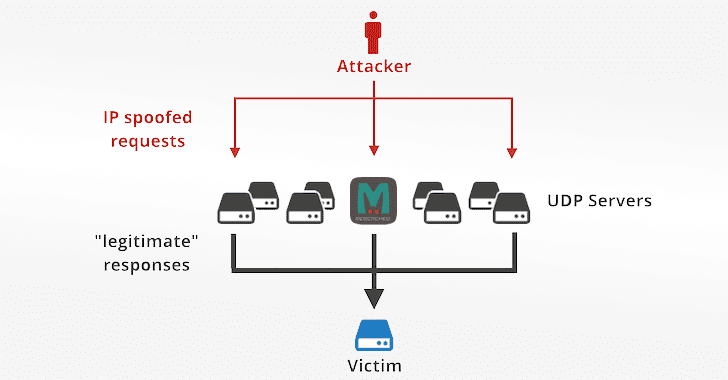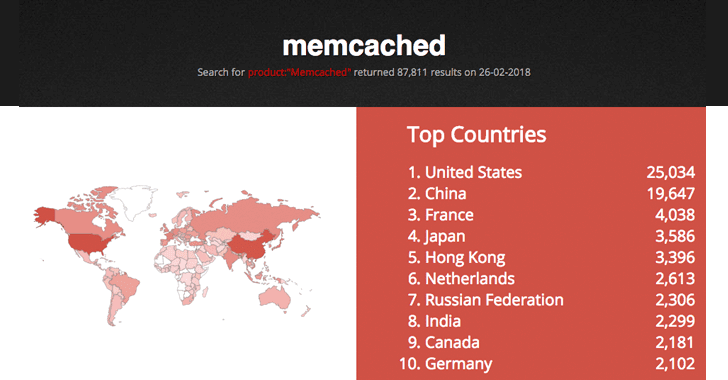Memcached Servers Abused for Massive Amplification DDoS Attacks
Cybercriminals have figured out a way to abuse widely-used Memcached servers to launch over 51,000 times powerful DDoS attacks than their original strength, which could result in knocking down of major websites and Internet infrastructure.
In recent days, security researchers at Cloudflare, Arbor Networks, and Chinese security firm Qihoo 360 noticed that hackers are now abusing "Memcached" to amplify their DDoS attacks by an unprecedented factor of 51,200.
Memcached is a popular open-source and easily deployable distributed caching system that allows objects to be stored in memory and has been designed to work with a large number of open connections. Memcached server runs over TCP or UDP port 11211.
The Memcached application has been designed to speed up dynamic web applications by reducing stress on the database that helps administrators to increase performance and scale web applications. It's widely used by thousands of websites, including Facebook, Flickr, Twitter, Reddit, YouTube, and Github.
Dubbed Memcrashed by Cloudflare, the attack apparently abuses unprotected Memcached servers that have UDP enabled in order to deliver DDoS attacks 51,200 times their original strength, making it the most prominent amplification method ever used in the wild so far.
According to the researchers, just a few bytes of the request sent to the vulnerable server can trigger the response of tens of thousands of times bigger.
In total, researchers have seen only 5,729 unique source IP addresses associated with vulnerable Memcached servers, but they are "expecting to see much larger attacks in future, as Shodan reports 88,000 open Memcached servers." Cloudflare says.
But TCP is not currently considered a high-risk Memcached reflection/amplification vector because TCP queries cannot be reliably spoofed.
The popularly known DDoS amplification attack vectors that we reported in the past include poorly secured domain name system (DNS) resolution servers, which amplify volumes by about 50 times, and network time protocol (NTP), which increases traffic volumes by nearly 58 times.
One of the easiest ways to prevent your Memcached servers from being abused as reflectors is firewalling, blocking or rate-limiting UDP on source port 11211.
Since Memcached listens on INADDR_ANY and runs with UDP support enabled by default, administrators are advised to disable UDP support if they are not using it.
The attack size potentially created by Memcached reflection cannot be easily defended against by Internet Service Providers (ISPs), as long as IP spoofing is permissible on the internet.
In recent days, security researchers at Cloudflare, Arbor Networks, and Chinese security firm Qihoo 360 noticed that hackers are now abusing "Memcached" to amplify their DDoS attacks by an unprecedented factor of 51,200.
Memcached is a popular open-source and easily deployable distributed caching system that allows objects to be stored in memory and has been designed to work with a large number of open connections. Memcached server runs over TCP or UDP port 11211.
The Memcached application has been designed to speed up dynamic web applications by reducing stress on the database that helps administrators to increase performance and scale web applications. It's widely used by thousands of websites, including Facebook, Flickr, Twitter, Reddit, YouTube, and Github.
Dubbed Memcrashed by Cloudflare, the attack apparently abuses unprotected Memcached servers that have UDP enabled in order to deliver DDoS attacks 51,200 times their original strength, making it the most prominent amplification method ever used in the wild so far.
How Memcrashed DDoS Amplification Attack Works?
Like other amplification methods where hackers send a small request from a spoofed IP address to get a much larger response in return, Memcrashed amplification attack also works by sending a forged request to the targeted server (vulnerable UDP server) on port 11211 using a spoofed IP address that matches the victim's IP.According to the researchers, just a few bytes of the request sent to the vulnerable server can trigger the response of tens of thousands of times bigger.
"15 bytes of request triggered 134KB of response. This is amplification factor of 10,000x! In practice we've seen a 15-byte request result in a 750kB response (that's a 51,200x amplification)," Cloudflare says.According to the researchers, most of the Memcached servers being abused for amplification DDoS attacks are hosted at OVH, Digital Ocean, Sakura and other small hosting providers.
In total, researchers have seen only 5,729 unique source IP addresses associated with vulnerable Memcached servers, but they are "expecting to see much larger attacks in future, as Shodan reports 88,000 open Memcached servers." Cloudflare says.
"At peak we've seen 260Gbps of inbound UDP memcached traffic. This is massive for a new amplification vector. But the numbers don't lie. It's possible because all the reflected packets are very large," Cloudflare says.Arbor Networks noted that the Memcached priming queries used in these attacks could also be directed towards TCP port 11211 on abusable Memcached servers.
But TCP is not currently considered a high-risk Memcached reflection/amplification vector because TCP queries cannot be reliably spoofed.
The popularly known DDoS amplification attack vectors that we reported in the past include poorly secured domain name system (DNS) resolution servers, which amplify volumes by about 50 times, and network time protocol (NTP), which increases traffic volumes by nearly 58 times.
Mitigation: How to Fix Memcached Servers?
One of the easiest ways to prevent your Memcached servers from being abused as reflectors is firewalling, blocking or rate-limiting UDP on source port 11211.
Since Memcached listens on INADDR_ANY and runs with UDP support enabled by default, administrators are advised to disable UDP support if they are not using it.
The attack size potentially created by Memcached reflection cannot be easily defended against by Internet Service Providers (ISPs), as long as IP spoofing is permissible on the internet.
Have something to say about this article? Comment below or share it with us on Facebook, Twitter or our LinkedIn Group.


